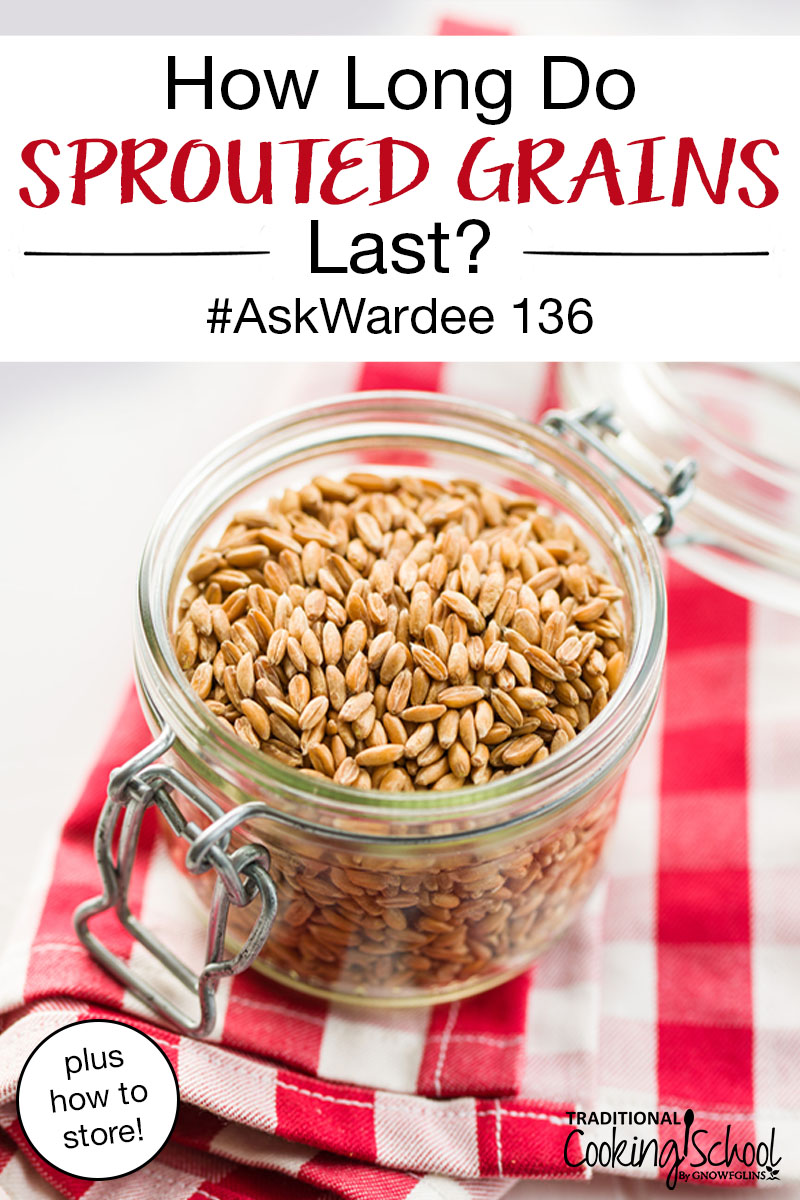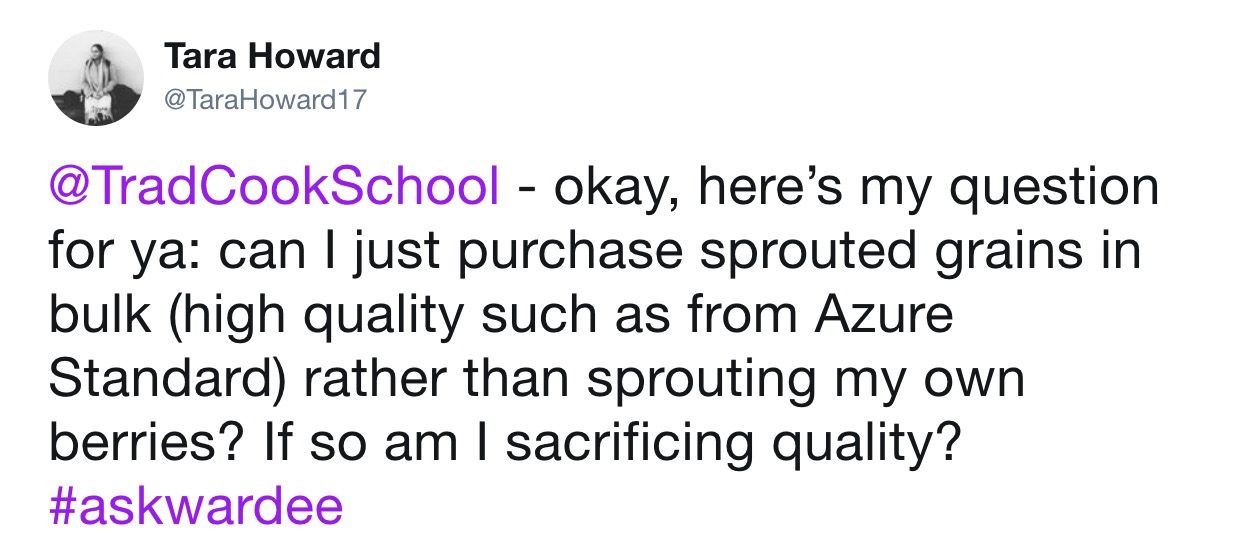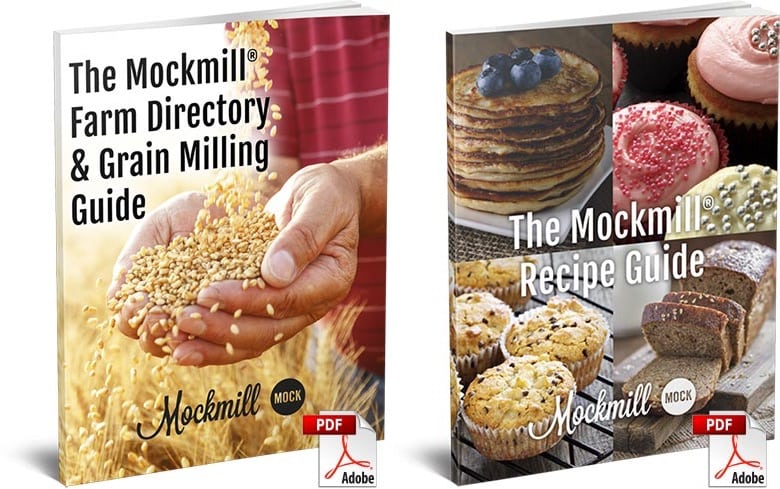
Rather than making everything yourself in your traditional cooking lifestyle, you might want to purchase some ingredients ready-to-go.
Like sprouted grains!
Why not get them in bulk? Then they’re handy to mill on-demand in your Mockmill (save 5%) so you can use the sprouted flour in recipes like cookies and muffins.
Yet… how long do the sprouted grains last? Are you sacrificing any quality by buying them in bulk instead of making what you need when you need it?
Tara’s asking this question… and today on #AskWardee, I’m answering it!
Keep reading or watching below to learn more!
Subscribe to #AskWardee on iTunes, Stitcher, YouTube, or the Podcasts app.
The Question: Am I Sacrificing Quality By Buying Sprouted Grains Instead Of Making Them Myself?

Tara H. asked:
okay, here’s my question for ya: can I just purchase sprouted grains in bulk (high quality such as from Azure Standard) rather than sprouting my own berries? If so am I sacrificing quality?
Tara, thank you for your question!
Because we’re featuring your question today’s #AskWardee, you’re getting a gift — a FREE Mini eCourse! Our team will be in contact with you so you can choose which one you’d like!
How Long Do Sprouted Grains Last?
I’ve got really great news for you, Tara!
The process of sprouting converts the oil in the grains (a.k.a. berries), making the fat less volatile and less susceptible to rancidity. Therefore, sprouted grains are somewhat easier to store and they last longer than unsprouted.
This makes sprouted grains a perfect thing to buy in bulk and store for when needed!
The bottom line is: if stored properly, you’re not sacrificing quality. 🙂
How To Store Sprouted Grains (Or Flour)
You’re not sacrificing quality… yet how do you ensure your sprouted grains are stored properly so they do last?
Here’s how to store your sprouted grains/berries. I’ll also include how to store your sprouted flour, because inevitably, we often end up with a bit extra when milling, right?
How To Store Sprouted Grains/Berries
Store airtight and as cool as you can, preferably in a dark pantry that’s free of wide temperature fluctuations. Will keep months. If storing longer, use cold storage or store in oxygen-free containers such as vacuum-sealed.
How To Store Sprouted Flour
Grind only what you need to use. Store any unused sprouted flour in the fridge or freezer. Will keep in cold storage for a few weeks to a few months.
Benefits Of Sprouted Grains: Why Would You Want To Use Sprouted Grains/Flour?
#1 — It’s more nutritious.
Sprouting neutralizes enzyme inhibitors and phytic acid in grains. This improves your digestion and your own body’s ability to assimilate minerals (because phytic acid blocks mineral absorption).
Sprouting also increases vitamin levels and transforms the grain from bound-up complex carbohydrates into simple sugars.
Finally, sprouting pre-digests gluten, which can really help those who are gluten sensitive.
#2 — It’s so convenient.
If you sprout and dry your grain berries, you’ve got ready-to-go sprouted grain that’s already optimized for best nutrition and digestion.
So … take that sprouted grain, grind it into flour with your Mockmill (get 5% OFF here), and then use it in any recipe as-is.
No need to add a soaking or souring stage (though if there is one, go ahead and follow it). It’s instant gratification!
Who says you can’t make cookies or muffins on the spot in traditional cooking? With sprouted flour, you can!
#3 — The taste!
The process of sprouting takes a hearty, dense seed and begins transforming that seed into a young plant. This changes the flavor from hearty into lighter and fresher.
You may really love this! Keep in mind that your baked goods may be a little more fragile, too.
How To Make Sprouted Grains
In case you have time for or want to save money by making your own sprouted grains/flour… I show you how to do it in our Einkorn Baking eCourse and our Fundamentals eCourse. You can use the method with any grain, whether it’s wheat, spelt, kamut, rye, or einkorn!
Get the Fundamentals or Einkorn Baking eCourses as stand-alone items right here. Or, these online courses are included with your premium membership in our Bible-based cooking program (more info here).
My Favorite Grain Mill: The Mockmill — Save 5%!
The Mockmill is my favorite grain mill and the one I recommend! I’ve been recommending it for a while now and lots of you have already gotten one in your homes. Mockmill tells me you’re very happy and I’m glad about that. 🙂
The Mockmill is a home stone grain mill, and it’s engineered and manufactured in Germany by Wolfgang Mock. He started making home grain mills back in the 1970s, so he’s been doing it for over 40 years. It’s estimated that nearly 70% of the stone mills out there are made by him.
This mill is super exciting because it contains the best features of Wolfgang Mock’s milling career, yet it’s much more affordable. The reason it’s more affordable is because this mill comes in a durable recycled material housing (instead of expensive wood).
I love the Mockmill because it produces super healthy freshly-ground flour with a really fine texture. It doesn’t warm the flour up like some mills do, so the flour is more nutritious. Finally, the flour yields wonderful, light bread!
This mill will also grind all grains, even gluten-free. It can even crack grains for porridge, and it has many other uses (like some spices, nuts, and seeds).
See How The Mockmill Works In This Video…
All the details — including an exclusive 5% OFF and FREE SHIPPING — are on this page. By the way, it also comes as a KitchenAid attachment — very exciting for those who don’t want another appliance to take up any more room!
Also with your purchase of the Mockmill for 5% OFF, you’ll get two fantastic eBooks from the Mockmill team: The Mockmill Farm Directory & Grain Milling Guide and The Mockmill Recipe Guide. Both of these eBooks are fabulous!
And, for a limited time… if you decide to purchase the Mockmill, I’m ALSO throwing in complimentary copies of both my Sourdough A to Z and Einkorn Baking eBook and Video Packages. They’re each worth $64 for a total of $128 in additional bonuses from me.
To claim your extra free bonuses from me after purchasing the Mockmill at 5% OFF, just go to tradcookschool.com/millbonus. Have your order # handy, because you’ll need it to claim the two free eBook packages! (Your bonuses from Mockmill will come from them.)
 Want our FREE “Home Grain Milling 101” eBook? Click here to download the “Home Grain Milling 101” eBook for FREE!
Want our FREE “Home Grain Milling 101” eBook? Click here to download the “Home Grain Milling 101” eBook for FREE!
Any Questions Or Comments?
If you have other questions or comments about your own experience with storing or using sprouted grains, be sure to leave them in the comments!
Helpful Links
- FREE 14+eBooks and FREE Traditional Cooking Video Series
- Traditional Cooking School’s Bible-Based Cooking Program info
- The Mockmill —my favorite and recommended (affordable) home stone grain mill — Hurry! Get 5% OFF and $128 in Mini eCourses from me for a limited time!
- Claim your FREE ($128 value) bonuses from me with your purchase of the Mockmill here!
- Free “Home Grain Milling 101” eBook — our entire 4-part series combined into a single, FREE download from me!
- Home Grain Milling 101, Part 1: The Basics
- Home Grain Milling 101, Part 2: Milling Gluten-Free Grains Into Flour
- Home Grain Milling 101, Part 3: Baking With Fresh Ground Flour
- Home Grain Milling 101, Part 4: More Fun Things Your Grain Mill Can Do!
- Do Sprouting, Culturing, Or Sourdough Reduce Carbs? AW905
- How to Store Flour and Grains
- FREE Webclass: Baking With Fresh-Ground Flour
- FREE No-Knead Sourdough Einkorn Bread Recipe
- FREE Sourdough Starter Instructions
- Why I <3 Einkorn — in case you want to know why we bake with the healthier 5,000 year-old wheat called einkorn!
- Where To Buy Einkorn
- Azure Standard
- Fundamentals and/or Einkorn Baking eCourses — to learn how to make homemade sprouted grains/flour
What Is The #AskWardee Show?
The #AskWardee Show is the weekly show devoted to answering your niggling questions about Traditional Cooking: whether it’s your sourdough starter, your sauerkraut, preserving foods, broth, superfoods or anything else to do with Traditional Cooking or your GNOWFGLINS lifestyle.
I share tips and resources, plus answer your questions about Traditional Cooking!
The Details
When: Wednesdays at 10am Pacific / 1pm Eastern
Where: Right here at AskWardee.TV or on social media: Traditional Cooking School on Facebook, Traditional Cooking School on YouTube, or @TradCookSchool on IGTV.
Subscribe: Find #AskWardee podcast on iTunes, Stitcher, YouTube, or the Podcasts app. While you’re there, be sure to leave a rating and review!
Want To Get YOUR Question Answered?
Here’s how to submit your question. If we answer it on #AskWardee, you’ll get a gift!
- Tweet your question to @TradCookSchool on Twitter; use hashtag #AskWardee
- Send an email to wardee at AskWardee dot tv — add #AskWardee to your email so I know it’s for the show
Please do NOT add future questions for #AskWardee to the comments of this post because they might get missed!
Do you make or buy sprouted grains? How do you store them? How do you use them? Please share your thoughts in the comments!
We only recommend products and services we wholeheartedly endorse. This post may contain special links through which we earn a small commission if you make a purchase (though your price is the same).




Good morning,
Which process retains the most nutrients? Soaking,sprouting or fermenting?
Hi, Kathy.
They all retain nutrients, while sourdough/fermenting is the one that makes the grains most nutritious and digestible by doing the best job at neutralizing phytic acid and deactivating enzyme inhibitors.
~Danielle, TCS Customer Success Team
Thank you.
Can you sour sprouted grains? Is there a point to doing this?
Hi Sara,
You can sour/ferment sprouted grains. However its somewhat redundant since you have already neutralized enzyme inhibitors and phytic acid in grains.
If its all you have to feed your sourdough, it wouldn’t hurt. 🙂
~ Vicki, TCS Customer Success Team
my sourdough starter does not like sprouted wheat at all.